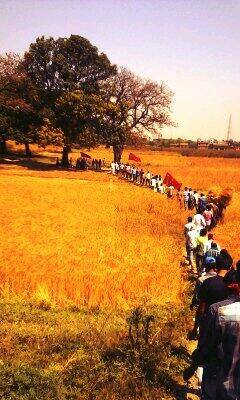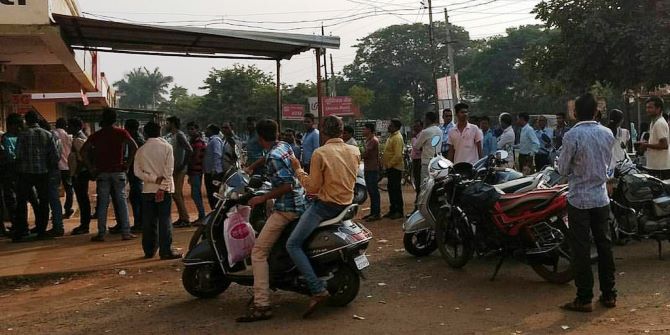Kalpana Wilson examines grassroots mobilisations in Bihar against an electoral victory for BJP’s prime ministerial candidate Narendra Modi—and the Hindu right’s efforts to suppress them.
The well-worn phrase ‘the world’s largest democracy’ is reached for repeatedly by journalists covering the current Indian elections for the international media. Underlying it is the assumption that whatever the outcome of these elections, it will be the choice of India’s people. Questioning this glib claim, many have pointed to the scale of corporate backing for BJP prime ministerial candidate Narendra Modi and the unprecedented spending and PR involved in his campaign as well as the bias of the media. But what does the electoral process itself look like on the ground? Which local groups are Modi’s allies and how do they operate? And how are they being resisted?
 CPI(ML) rally in Mairwa, Siwan, Bihar in May 2014
CPI(ML) rally in Mairwa, Siwan, Bihar in May 2014
Bihar is a key state in this election. Observers suggest that the much-heralded ‘Modi wave’ has markedly failed to materialise here (also see here). The reasons are complex, but as in a number of other states, it is the rural and urban poor, Muslim communities and peasants from the ‘Other Backward Castes’, who have been mobilising against a Modi victory. Much liberal commentary laments the alleged triumph of ‘caste’ affiliations over ‘development’ concerns in shaping the current Bihar polls. But in reality, questions that are central to development – questions of the distribution of land and resources, and of the absolute necessity of meaningful democracy for people-centred development – have been at the heart of the elections here.
Dalits and other poor communities are once again having to defend a hard-won battle for the right to cast their own votes, denied them by higher caste landowners. The breakthrough in civil rights in Bihar came in the late 1980s and 1990s. Following a series of movements for decent wages, land redistribution and an end to rapes of Dalit women by landlords who saw it as their birth right, large numbers voted for the CPI(ML), the revolutionary left party that led these movements. As Shanti Devi, a Dalit woman agricultural labourer told me in 1996, “We got the courage to fight. Things have changed, we answer back, we talk to them as equals.”
In 1994 Bhumihar landlords responded to this assertion by the rural poor of their right to vote by forming the Ranvir Sena. While Bihar was already known for the succession of violent caste armies set up by different landowning groups, the Ranvir Sena was more organised, more heavily armed and funded than its predecessors, and organically linked to the Hindu right. The horrific nature of the violence inflicted by the Ranvir Sena in a series of massacres of landless Dalit and Muslim women, children and men prefigured the massacres of Muslims in Gujarat under Modi in 2002. But the connection doesn’t end there: like Modi, the Ranvir Sena’s founder Brahmeshwar Singh was a lifelong cadre of the RSS, the fascist-inspired organisation at the heart of India’s Hindu right.
Leaflets circulated by the Ranvir Sena, characterised by hatred and demonisation of Muslims and Communists, are taken directly from RSS tracts. Nitish Kumar, the incumbent chief minister, a favourite of the World Bank for his pro-corporate neoliberal approach, and until recently in an alliance with the BJP, hastily disbanded the judicial commission set up to probe the political links of the Ranvir Sena before its findings could be made public. But it is common knowledge that while all the major parties utilised the Sena to try to crush the assertion of the rural poor and its left leadership, its core loyalty remains with the BJP. Like many other armed and violent Hindu right-wing organisations across the country, the Ranvir Sena is today a key ally for Modi on the ground.
 CPI(ML) campaign in Ara, Bihar, in April 2014
CPI(ML) campaign in Ara, Bihar, in April 2014
What this means for democracy was demonstrated when the Ranvir Sena reportedly assassinated two people days before polling in Ara constituency: one was Budhram Paswan, a local CPI(ML) leader, himself a Dalit. His killers fired shots in the air to mark his murder as a political assassination and to terrorise those intending to vote for his party. The other was a young Muslim teacher Akbar Khan, whom the Ranvir Sena claimed to have murdered for cheering Pakistan during a cricket match. His murder was an attempt to terrorise Muslims and – as has been the BJP’s pre-election strategy in Uttar Pradesh and elsewhere – to orchestrate Hindu-Muslim violence. In this case it failed because Akbar, who taught poor children, both Hindu and Muslim, for free, and had organised to keep the streets free of sexual harassment for schoolgirls, was very popular among local people of all communities.
Since then, Bihar BJP leader Giriraj Singh has publicly announced that opponents of Modi will have “no place in India” once he wins and should “go to Pakistan”. Despite this level of intimidation, the CPI(ML) in Ara saw hundreds of young people, including large numbers of young women, walking from village to village to campaign for their youthful candidate Raju Yadav. Among them was Rachna, a 20-year-old student from Ara town, who explained that she was drawn to campaign by her concern for issues of women’s freedom: “Here we are consulted, we’ve helped to shape the campaign – it’s a breath of fresh air.”
While Modi has been forced to invoke his own ‘backward caste’ origins to try to broaden his appeal in Bihar, his party’s base is still solidly upper caste and its campaign reeks of hostility to lower castes, Muslims and poor people. Ara’s BJP candidate RK Singh, a former elite civil servant, referred on television to his “disgust” for “uneducated people”, at the same time seeking to whip up hysteria by claiming knowledge of terrorist plots to kill Modi, a ploy favoured by Modi himself. Ongoing court cases allege that Modi fabricated several plots to assassinate him during his tenure as chief minister of Gujarat, leading to a number of staged killings by the police, including that of student Ishrat Jahan.
In Bihar, since unexplained blasts during a Modi rally in Patna, Muslim communities have experienced a reign of terror in which teenage boys have been indefinitely detained without charge by the National Investigation Agency (NIA) and tortured in an attempt to extract false confessions. This was the experience of 19-year-old Aslam Parvez and his cousin Irfan Ansari from Arwal district. Along with several other youths from their village, both were severely tortured in custody. Ansari was told, “we’ll make sure no Muslim from Arwal ever gets a government job.” Parvez’s father was also interrogated by NIA officers who asked, “why won’t you and your family vote for Modi?” This highlights not only the NIA’s own institutionalised Islamophobia but also a disturbing level of political collusion with the Hindu right’s agenda.
So what then of Modi’s alleged mass support among ‘young’ voters? Bihar presents a very different picture—of young women like Rachna campaigning in defiance of Hindu right-wing terror; of young men in Parvez’s village finding the courage to protest communal profiling, torture and criminalisation; and of a generation which wants a very different kind of change from the rapid slide into fascism Modi promises.
About the Author
Dr Kalpana Wilson is Senior Fellow in Gender Theory, Globalisation and Development at the LSE Gender Institute.








Dear Ms. Kalpana,
I have read your article very late but it provided me an opportunity to have academic engagement about politics in Bihar. First, I would like to thank you for writing this excellent piece and making available to all prospective readers. I am agree with you at most of the time about Hinduization of NIA or upsurging of Ranvir Sena during Loksabha election in Bihar. But, you have not paid much attention to explain the linkages – Bihar has history for fighting against fascist Hindu forces and Lalu and Nitish become model of this struggle but it can’t be forget ted that Ranvir Sena’s chief Brahmeshwar was killed, a huge procession was organized and there have been observed several incidences of failure of law and order in the state and Nitish has done nothing than watching those disturbing news. At the same time, Lalu and Nitish has ruled in Bihar for more than twenty years but fail to strengthen the situation of Dalits and marginalized communities despite they have been voted by these groups for years. Later, where was law and order, when the people were killed on the eve of election day because the law and order is a state issue .
Madam, there is need to deconstruct this idea of Hindutava and Upper Caste. You can better learn it from cases in UP, when Dalit cheif minister Mayawati has cherished working with group of upper castes and come with slogan from Bahujan to sarvajan for building vote bank. The same has also repeated in Bihar under the regime of lalu and Nitish. The very common point is that these politicians have used Dalit to control the reign of power.
Thanks
Thanks